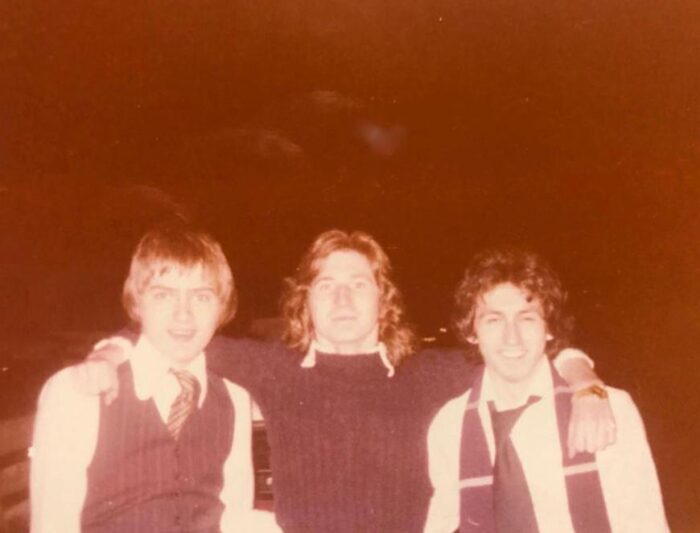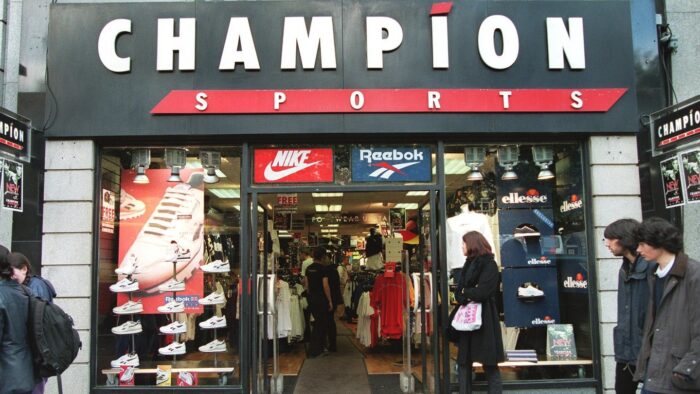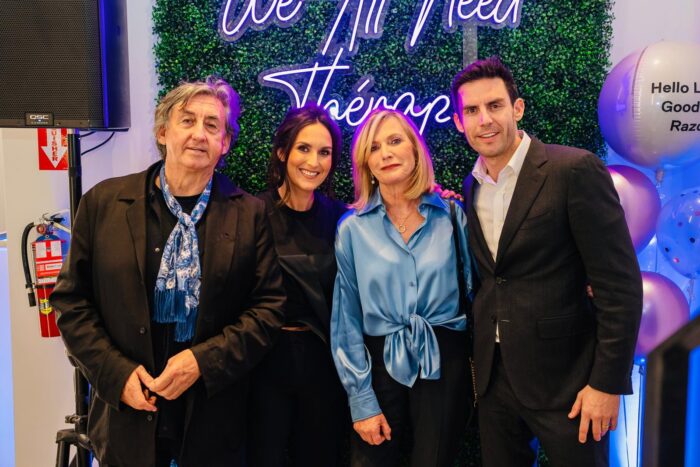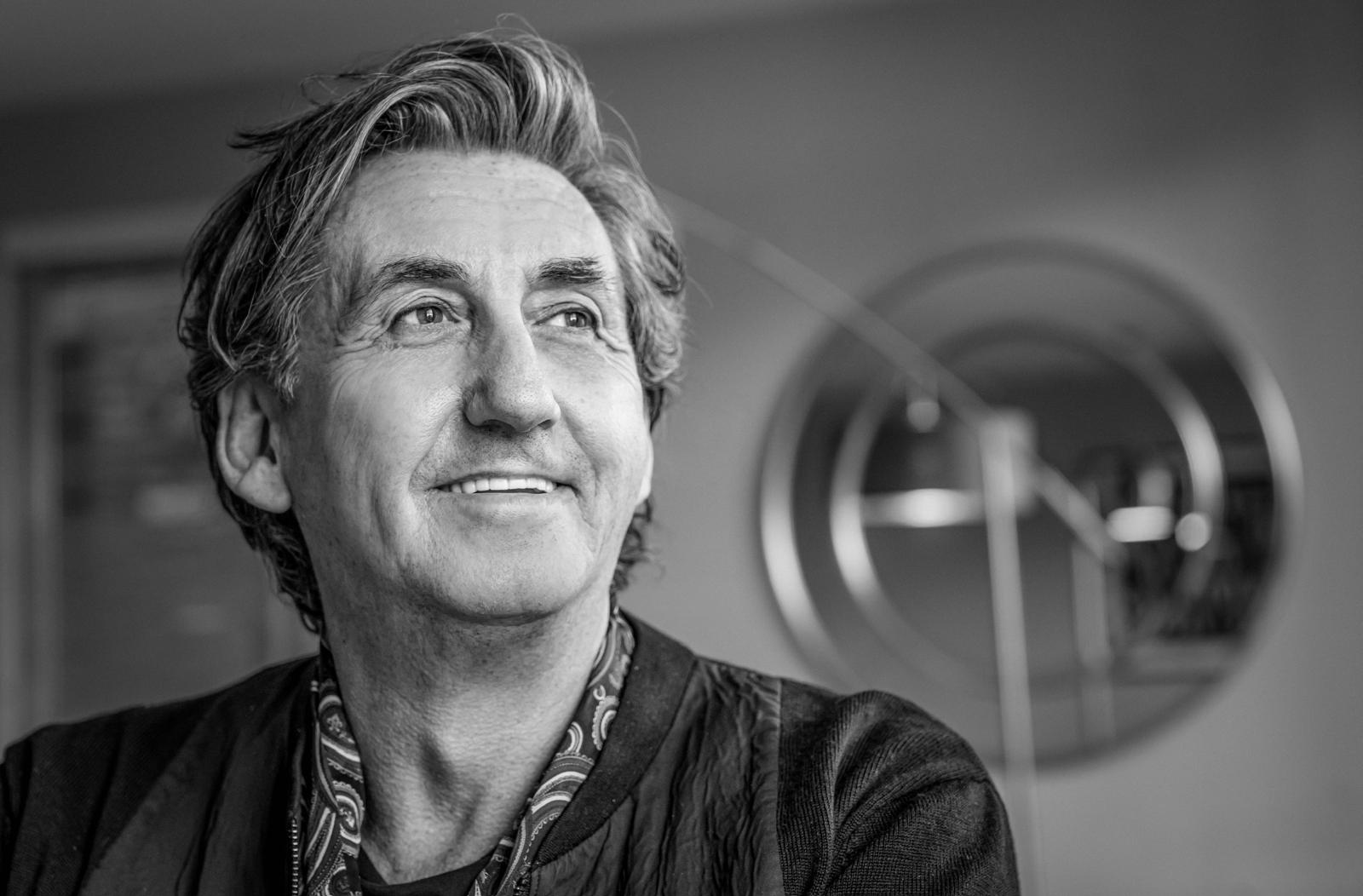Paul McGlade left school at 16, and his first job was in a travel agency. He was still in his teens when he started his next job with Woolworths, the famous retail chain ubiquitously known as Woolies that had operated in Belfast since 1915.
McGlade’s dealmaking spirit was immediately obvious. Noticing piles of old music tapes gathering dust in a stockroom, he asked the store if he could take the tapes and sell them at a stall in Jonesborough, a well-known market in Newry.
McGlade sold all the tapes within an hour. He drove back to Belfast and bought the rest, selling them too.
For six months, he ran a stall at the weekends, building up enough money to buy a van. By this point, he was selling more than just tapes and was travelling to markets around the entire island of Ireland.
“Every penny that came in, he gave to his mother Marie,” Rita, who later became his wife, recalled this week following his death. “His parents separated, so his mother told him: ‘You are the man of the house now.’ His mother told him he needed to take care of his family, which he did.”
Although the word was not popular at the time, Paul McGlade was now an entrepreneur.
In the coming decades, he would change the face of Irish retail. His story, while relatively little known, is one of the all-time greats of modern Irish business.
“No such word as won’t”
At 17, Paul McGlade moved to Dublin. His first business was City Limits, a discount retailer located along the quays of the river Liffey in Dublin. His partner was Charlie O’Loughlin, a young man from Newry who would later found the retail business EuroGiant. They were part of a group of friends who all moved to Dublin in search of better opportunities as the Troubles worsened in the North.
Another close friend was Paddy McKillen, who would go on to co-own London’s most luxurious hotels including Claridges and the Connaught. Their other friends included Pat Hanratty, a mining engineer, and his cousin Michael Hughes, who later became a priest in Canada.

Barely 20, McGlade met Rita Reddy, and the two started going out. She had worked in Dunnes Stores and was hard-working and entrepreneurial too. McGlade told her about an idea he had.
Brian O’Hagan owned an office in Westmoreland Street but, on its ground floor, little was happening. So, McGlade decided to open up a Santa Claus Shop there for just eight weeks in the build-up to Christmas.
It was so successful that he kept the outlet on afterwards, and, when the lease came up for sale six months later, he had enough money to buy it.
A year later, as the 1970s was coming to an end, McGlade saw an opportunity to take on a shop in Moore St, which was previously a butcher’s shop called Shields.
Rita can still remember going to sign the lease on the building with him: “We were walking up the stairs and I thought they were cats, but they were actually rats coming down the stairs.”
The young couple cleaned the place up and reopened it as Apollo 1 in 1980. It was a discount store that would become hugely popular because of its bargains – not just in the inner city, but well beyond also.
“We sold everything from cheap soap to hi-fi,” Rita said. “All walks of life came in. Our staff were mainly from working-class backgrounds and Paul gave them an education. He made them feel pride and he taught them everything about retail.”
Colm Carroll was a manager in Apollo 1, and he would go on to launch Carrolls Irish Gifts, a successful chain aimed at tourists visiting Ireland. Joe Boland, now the general manager of L’Oréal Ireland, is another of its alumni.
In 1981, Paul McGlade married Rita, and they would go on to have four children: Paul, Phillip, Katie, and William.
McGlade’s work ethic and drive was immense. He was the first to open his shops on a Sunday in Dublin, a move that reflected the new modern Ireland that was coming.
“Paul took out big ads in The Evening Press and The Herald. It was a gamble,” said Rita. “I remember saying: ‘Oh my God, this isn’t going to work.’ But he was the most positive man I ever met. He said, ‘there’s no such word as ‘won’t’.”
His next store was again focused on bargains. It was called SuperX on Henry Street, and the business was now so big he took on a warehouse in the Robinhood Industrial Estate in Dublin 22.
Socks, watches, and Black Monday
Paul McGlade regularly partnered with his friend Paddy McKillen on different business ventures. On a family holiday to Florida with McKillen, he met Johnny Ronan, the developer who owned a home there. Ronan’s father was John Ronan Sr, a successful meat and farming businessman from Tipperary. Ronan Sr had invested in property in Dublin, and his son was now working with him on these properties while developing his skills as a developer. Ronan wanted to come in as a partner; McGlade initially said no.
But a deal would come together. Ronan had a property business and McGlade had cash flow from his retail businesses. In 1987, Paul McGlade sold out of his Irish businesses to Ronan and McKillen as he wanted to move to Britain and test his mettle there.
One of the buildings that McGlade sold out of was on the corner of Grand Canal Street Lower, on the site of Boland’s Bakery, which was occupied by Irish rebels during Easter 1916. Apollo 1 bought this building for just £300,000 in 1983. It would go on to become the Treasury Buildings, which today is being redeveloped by Ronan for Google.
Paul McGlade and Rita moved to London around 1986, to pursue a new retail vision. This was a watches chain called the AM/PM Group, which opened its first store in 1988 on Kensington High Street in London. The plan was to open 75 stores, but Britain was a harder market than Ireland.
Competition was fierce as new watch chains opened and existing stores upped their game. Black Monday happened in 1987 and interest rates hit 17 per cent.
“Paul was paying big rents because he was in prime locations,” Rita recalled. “England wasn’t like Ireland, as they copped on much quicker what success was, so lots of other watch shops opened.”
It became apparent to McGlade he was not going to make a second fortune from the watch business, but then another chance came along.
In 1990, Sock Shop, a niche retailer once valued at £75 million, went into administration. McGlade was part of a consortium that acquired the group, along with its management.
The Sunday Times described him at the time as a “discount store king”, but, as the decades went on, he became much, much more than that.
In August 1990, the McGlade consortium bought Sock Shop for just £3.25 million with backing from Murray Johnstone, a Scottish financial group. Juan Olaso, the former managing director of watchmaker Omega UK, went in to run the business. Sock Shop had dozens of stores and a well-known brand. McGlade later exited this business and came back to Ireland.
“He was always teaching us without even thinking”
Initially, Paul McGlade looked at opening shops selling lottery cards, something that was becoming very popular in Ireland and Britain.
He was also selling sunglasses. Again, it was something people wanted as, in the 1990s, people could afford to travel more as the economy improved and Ryanair and travel agents started offering cheap flights allowing ordinary people to go to the sun.
Meanwhile, in England, he co-founded a dating agency called Make-a-Date. It was later rebranded as Who-is-Who, and based on Ely Place in Dublin.
At the same time, Paddy McKillen now owned a large former Apollo 1 unit on O’Connell Street so he asked McGlade what retail unit might work there. It was two years after the 1990 World Cup and Paul McGlade felt a sports shop would work there.
The banks were not lending, so McGlade asked his sister Marie for a loan of £60,000 to get the business going. It would become Champion Sports, at one stage Ireland’s largest sports retailer.

Champion Sports was 45 per cent owned by McGlade, 45 per cent by McKillen and 10 per cent by their financial controller Liam Cunningham. It quickly became a success and started to expand.
McGlade’s children were older now, and they all started working in different arms of the business from their early teens.
After Paul McGlade separated from his wife Rita, he would bring his children into the business on weekends. He would position Phillip McGlade at one end of Grafton Street and his daughter Katie at the other.
“We had to count how many Champion Sports bags there were, and how many of our competitors,” Phillip McGlade recalled. “He always wanted to know how many bags, and who had the better market share. Dad loved business, and he was always teaching us without even thinking.”
A Champion deal
Champion Sports became a big success story. On a visit to the McGlade family home, Mike Ashley wanted to acquire Champion Sports but instead, Paul McGlade offered to buy Sports Direct from the British retailer.
In 1999, Champion acquired rival Marathon Sports for £10 million, a deal that created a group with 26 stores and revenues of £50 million. In 2004, Champion Stores sold 11 units to American chain Foot Locker. Two years later, Champion Sports itself was sold to a consortium chaired by accountant Bernard Somers with backers including the developer Bernard McNamara. It was a hectic time as the Celtic Tiger roared.
McNamara and others had just bought Superquinn for hundreds of millions of euros. McGlade and McKillen were in the process of selling the business to international group JD Sports when the Irish group, backed by Anglo Irish Bank, came in with a knock-out bid.
John Quinn, an advisor to McNamara when he was with Merrion Corporate Finance, came in as chief executive of Champion, which then had 17 outlets. The deal valued Champion at €60 million including debt. It was a fortuitous exit as the group would later be hit by the financial crash. JD Sports later bought Champion in 2011, for a fraction of its valuation in 2006. Its Irish stores are now among their most successful.
Instinct and ideas
Paul McGlade also made an impact in the restaurant industry. Champion Sports took a unit on Grafton Street, which was below Captain Americas. McGlade, McKillen and their families were regulars at the American-style restaurant.
Its owner, the developer Mark Kavanagh, wanted to sell it. McGlade and McKillen bought him out and grew a small chain. “Dad wasn’t even looking for that deal,” Paul McGlade Jr recalled. “It just happened. He bumped into Mark one day. That’s how he did things.”
Johnny Ronan invested with them in their Dún Laoghaire branch. The trio – McGlade, McKillen and Ronan – had previously invested together with Jerry Beshoff in Beshoffs, a famous family-owned fish-and-chip founded in 1939. Its Westmoreland Street restaurant is today based in the building where McGlade launched the Santa Claus Shop.
McGlade had long been interested in restaurant chains. He had previously offered, along with McKillen, £5 million to buy the global rights to Wagamama, an Asian food chain in Britain. A deal nearly closed, but then its owners got cold feet.
Paul McGlade read voraciously about business.
Not wanting the deal to die, McGlade asked if he could have its Irish franchise. Wagamama’s then-owners hadn’t thought of that approach and agreed, and the restaurant now has three franchise units in Ireland.
McGlade was right about the potential of Wagamama. In 2023, global private equity giant Apollo bought the global business for £700 million. During the financial crisis, Paul McGlade also created Pygmalion, a large bar in the Powerscourt Centre off South William Street.
He was initially in business with Jay Bourke, but later the McGlade family took it over. It is one of Dublin’s most successful bars, and Paul McGlade Jr also set up Little Pyg, a pizza and cocktails venue nearby.
“My Dad loved Pygmalion, and there are 120 staff there,” according to Paul McGlade, who runs this business.
Paul McGlade Sr’s ability to do a deal was instinctual. Only in May, he read an article in Bloomberg with his son Paul Jr about the first Mexican Taco stand to get a Michelin Star. Called Taquería El Califa de León, nothing would do for Paul McGlade other than to fly with his son to sample its food.
“We just got on a flight and went,” Paul McGlade Jr said. “The owner didn’t even know we were coming. I brought a friend of mine as a translator, and we talked. We ended up doing a deal with the guy for the worldwide exclusive rights to open this Michelin-starred taco restaurant/stall.”
Ahead of his time
In 2001, Paul McGlade had set up a business on Molesworth Street called Thérapie. His initial idea was to make it a massage business but it expanded into aesthetics. In the 1990s, McGlade had previously opened the Body Clinic in Britain offering cutting-edge beauty treatments.
“One thing about my Dad is he was ahead of his time,” Paul McGlade Jr said. “But being ahead of your time doesn’t mean you’ll be successful all the time.”
The treatments being offered by Body Clinic weren’t yet popular so it lost millions. Paul McGlade asked his son Phillip McGlade to get involved in Thérapie. “Phillip brought a new lease of life to the business,” Paul McGlade Jr recalled. A second store opened in Galway.
Katie McGlade was working part-time front-of-house in Therapie while doing her degree. In 2010, an opportunity came up to open a clinic in Cork, so she decided to drop out of college. “My Mum went mad at the time,” Katie McGlade said.
“Dad wanted Katie to follow her passion. He was very proud of her and Phillip,” Paul McGlade Jr added. From there, Therapie went to Limerick and other locations in Ireland, before expanding to Britain in 2018, starting in Edinburgh.
Botox and other beauty treatments were becoming more popular and Thérapie became one of the fastest-growing groups in the sector. Today, Therapie has 75 outlets in Ireland, Britain and the United States.
In July, it said it was planning to open 65 more outlets over the next three years creating 1,000 new jobs.

“Dad was passionate about Thérapie,” Phillip McGlade said. “Every day he’d ring me up and ask about sales. He always believed that Therapie was a multibillion-dollar company. He had the vision that Thérapie could do that.”
He helped his children with strategy, bringing in his friend Andy McCue, previously chief operating officer of Paddy Power Betfair PLC, as a director.
“We’ve really professionalised the business to grow,” Phillip McGlade Jr said. McCue and Paul McGlade were also involved together in Hale Vaping, one of Ireland’s biggest vaping companies. The founder of this business, Stuart Fagan, is another valued friend.
*****
Paul McGlade read voraciously about business and travelled extensively looking for new ideas. He thought big and he dreamed big.
He changed the face of Irish retail, yet managed to remain low profile. He employed thousands of people and gave many people their first start.
He was an advisor and mentor to many people in Irish retail, often for nothing. He was a loving father who cared about his children and was proud of their success. He started playing padel tennis in his 60s and encouraged his son Will to launch a new sports and wellness venture called House of Padel. He never stopped thinking about the next deal, and was open to taking risks.
He understood not everything worked out. His son Paul McGlade Jr had run a finance company called ACAP but got his timing wrong, launching a year before the global financial crash. Undeterred, Paul McGlade Sr had met an Indian businessman in Spain who he liked. McGlade Jr and Sr decided to go into business with this businessman in Goa in India, creating a hospitality business.
Paul McGlade simply never gave up. “Paul was like a Duracell battery, he just kept going. He was an entrepreneur before people even knew what the word was,” his former wife Rita said.
His vision never stopped. In the 1980s, when there was a glut of Rubik’s Cubes in Germany, McGlade bought them all and created the craze in Ireland. When rollerskates took off in America, he bought truckloads to sell here.
“He would have five or six containers always coming in,” Rita said. “His thing was buy three, get one free. He always believed in offering people bargains.” On the day he died suddenly in Spain last Thursday, Paul McGlade was texting friends. He had heard a retail business was for sale and he was trying to put a consortium together to buy it. Paul McGlade still had a lot to do.
One of his last texts to his daughter Katie said: “Every negative in health and business is a fantastic wake-up emergency call for the better in a positive way to create new opportunities. Look out for the new opportunity to improve. Kaizen never fails. Kaizen forever.”
Paul McGlade, founder of Therapie Clinics, Pygmalion and formerly Champion Sports, passed away after a short illness at the age of 69. He will be missed by his adoring children, Paul, Phillip, Katie and William, their mother Rita, his brother Johnny, sister Sharon, his six grandchildren and his many friends and family across the world.


